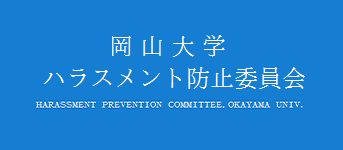Okayama University Measures against Harassment
1. Creating a Campus Free from Harassment
Upholding “Creation of advanced knowledge and inheritance of precise knowledge” as its mission, Okayama University is an academic community comprising students, faculty, staff, and other members engaged in such pursuits as education, research, and community activities. For all members belonging to Okayama University to work, conduct research, or receive education in a comfortable environment, they must respect each other’s personal dignity and human rights. However, in the context of power relationships or personal relationships between the members of the University, they may encounter incidents of harassment that may harm the victim’s personal dignity. Incidents of harassment may not only inflict mental or physical suffering on the victims and largely affect their life plans but also cause the deterioration of the working or learning environment of the people around them.
Based on this understanding, Okayama University set forth rules concerning the prevention of and measures against harassment, etc. These rules specify how to prevent harassment and how to respond if harassment has occurred, thereby ensuring the maintenance of an appropriate environment for performing duties, conducting research, and receiving education.
2. What is “Harassment”?
Okayama University prohibits “Sexual Harassment,” “Academic Harassment,” “Pregnancy Harassment,” “Harassment over childcare / nursing leave, etc.,” and “Other Harassment.”
Sexual Harassment is the act of making another person feel uncomfortable by one’s sexual language or behavior or discriminatory language or behavior rooted in a gender stereotype. This can take various forms, including reference to a physical characteristic of a sexual nature or sexual experience, indecent language or behavior, coercion into a personal or sexual relationship, unnecessary physical contact, and discriminatory language or behavior rooted in a gender stereotype.
Academic Harassment is inappropriate language or behavior that takes advantage of one’s authority, inflicts mental or physical suffering on another person, and deteriorates the working, education, or research environment. This can take such forms as a violation of the victim’s rights in an educational or research setting, obstruction of the victim’s career path (graduation, advancement to higher education, finding employment), neglect of one’s duty of instruction, being a hindrance to the victim’s research or work, physical or mental assault, ignoring the victim, making too many or too few demands of the victim, and infringing on the victim’s privacy.
Pregnancy Harassment is language or behavior concerning pregnancy or childbirth, or inappropriate language or behavior concerning the use of a measure or system related to pregnancy or childbirth, which leads to the deterioration of the working, education, or research environment.
Harassment over childcare / nursing leave, etc. is inappropriate language or behavior concerning the use of a measure or system related to childcare or nursing care which leads to the deterioration of the workplace, education, or research environment.
Other Harassment involve language or behavior that infringes on the human rights of another person or makes another person uncomfortable, and include such acts as forcing someone to drink alcohol, violence, an illicit act concerning smoking, and spreading insulting words, slanders, or rumors.
3. If You Suffer Harassment
If you suffer harassment, Okayama University has several resources that you can consult. Harassment counselors have a confidentiality obligation, and so details of your counseling sessions will be kept strictly private unless you consent otherwise. As a rule, harassment counseling will be given in the form of an interview or interviews.
(1) Harassment counselors
Each faculty and graduate school has its harassment counselors. You may consult not only counselors of your faculty or graduate school but also those of other faculties or graduate schools. If you wish to consult a harassment counselor, directly contact the counselor you wish to meet by email or telephone and make an appointment.
→ List of Harassment Counselors
(2) Harassment Prevention Office
Staffed with permanent counselors specialized in harassment, the Harassment Prevention Office is dedicated to providing consultation concerning harassment.
The Office is open at the times and locations shown below. If you wish to consult the Harassment Prevention Office, make an appointment by email.
The Harassment Prevention Office is not staffed with permanent counselors who can communicate in English. However, the Office can exchange emails written in simple English. Also, we will be able to arrange for an English-speaking staff member, etc. if you make a request to that effect when making an appointment.
- Tsushima Campus
Open: Monday-Friday 10:00-12:00, 13:00-16:00 (Negotiable)
(except holidays and library closed)
Location: Okayama University Central Library, West Building 4F
- Shikata Campus
Open: Monday & Friday 13:00-16:00 (Negotiable)
(except holidays)
※counselors present only during appointed hours
Location: Alumni Memorial Building 3F
- Contact (for both Tsushima and Shikata Campuses)
Email: harass1@adm.okayama-u.ac.jp
(3) Other resources for counseling
[1] Student Counseling Center
You can consult the Student Counseling Center on diverse topics of interest—studies, career paths and aptitude, personality and life-style issues, human relations, financial affairs, and problems concerning various forms of soliciting. The Center is staffed with full-time faculty members with a clinical psychotherapist’s qualification and counselors. Also, depending on the topic of counseling, faculty members belonging to each faculty’s Counseling Support Committee will provide counseling.
[2] International Student Advisor ← Find out more.
4. Measures against Harassment
After receiving counseling, if you wish Okayama University to take some action, the Chief of University Componenent you belong to or the Harassment Prevention Committee will take relevant measures. If you have any concern over harassment, feel free to consult any of the relevant offices.
Details of harassment measures are prescribed in the Okayama University Guidelines for Harassment Prevention. See also the “Guidelines on Matters that Okayama University Staff, etc. Should Understand for the Prevention of Harassment, etc.,” which we have drawn up as guidelines for Okayama University staff, etc. to follow.
Harassment Counseling Procedures


